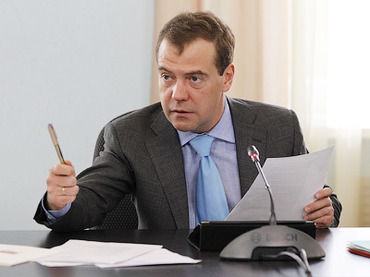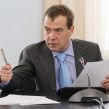
Moscow Sees Military Threats from All Directions
Publication: Eurasia Daily Monitor Volume: 9 Issue: 58
By:

The outgoing president, Dmitry Medvedev, chaired this week a session of the “expanded Collegium of the Defense Ministry” – a gathering of the nation’s entire top brass. Medvedev and Anatoly Serdyukov, Defense Minister since February 2007, both hailed the success of military reform that began in the fall of 2008 – Medvedev’s first year in office. According to Medvedev, “The reforming of the armed forces is practically over and most units are ready to go into battle on short notice.” Medvedev stated that since 2008, the percentage of modern weapons in the Russian military has increased from 10 to 16 and by 2020 must reach 70 or even 100 percent. New intercontinental ballistic missiles (ICBMs), computerized command and control systems, warplanes, antiaircraft and antimissile systems are planned to be procured (www.kremlin.ru, March 20; Kommersant, March 21).
According to Serdyukov, “[…] in the last ten years, security threats to Russia have increased.” The development of ballistic missile defenses (BMD) by the US undermines strategic stability, while the escalation of tensions on “the perimeter of our borders increases the risk of Russia being dragged into military conflicts” (RIA Novosti, March 20). Medvedev singled out NATO plans to deploy BMD in Europe: while continuing talks with Western “partners,” Russia must be fully ready by 2017-2018 to deploy countermeasures to BMD (www.kremlin.ru, March 20).
Anti-Western and anti-American official statements in Moscow did not dwindle after the presidential elections on March 4, as many in the West hoped, believing this was just electioneering PR. Aggressive anti-Western rhetoric in external and internal politics is the core of the present Russian regime. This week, Russian Foreign Minister Sergey Lavrov in a radio interview declared that Moscow will resist European attempts to force on Russia Western interpretations of free speech and gay rights. Lavrov acknowledged that “the USA and NATO have no intention of attacking us,” but that intentions are much less important than capabilities as Russian military experts “unequivocally” declare the development of US BMD a threat. Lavrov conceded that there are fields in which Russia and the US have common interests and goals, but these seem to be constantly contracting while the areas of conflict grow. Moscow supports the international forces in Afghanistan in fighting terrorism and narcotrafficking, but the mission seems to be failing, while narcotics and terrorists “are pushed north” into the territories “of our Central Asian allies and into Russia itself.” While announcing the termination of the Afghan mission in 2014, the US is “actively seeking ways” of establishing long-time military bases in Central Asia, which is seen in Moscow as a direct challenge – an attempt to take over the strategically important region and diminish Russia’s influence (https://www.kommersant.ru/doc/1897210).
The Kremlin sees threats coming from all directions: Central Asia, the Caucasus, a territorial dispute with Japan in the Far East over the Kuril Islands, a war of words with Canada over potential drilling rights in the Arctic and, on the western border, the planned future deployment of US BMD systems in Poland, Romania and on US warships in the Black and in the North Seas. In all cases, the US is seen as being involved ether directly or indirectly as the main adversary. The fact that present or future US BMD capabilities, which may appear after 2017, cannot threaten Russian ICBMs is not taken into consideration.
Last month, during a security conference in the closed nuclear arms designing and producing city Sarov (Arzamas-16), Yuri Solomonov – the chief designer of Russia’s newest land and sea-based ICBMs, Bulava-30, Topol-M and Yars – in the presence of the press told president-elect Vladimir Putin that most of the declarations about the threat to Russian strategic nuclear forces posed by US plans to deploy BMD in Europe “are hearsay” and self-defeating. “I have designed ICBMs for more than 45 years and announce this absolutely officially,” proclaimed Solomonov. He recalled the 1980s when Russian military and political leaders with dire consequences took seriously President Ronald Regan’s “Star Wars” Strategic Defense Initiative (SDI). While the Soviet Union was spending billions inventing countermeasures, the SDI plans turned out to be unfeasible. Solomonov demanded that in the future the assessment of BMD threats as well as proposals for possible BMD cooperation with NATO must be made by true specialists. Putin told Solomonov “thank you” without any further comment. Today it is clear that Solomonov’s and other Russian experts’ attempts to bring some sense into the official anti-BMD policy have failed (EDM, March 1).
This week, the Russian press leaked sensitive information that US Under Secretary for Arms Control and International Security Affairs Ellen Tauscher, who visited Moscow on March 13, provided Russian officials with classified information about future European BMD plans. Tauscher met with Deputy Foreign Minister Sergei Ryabkov, Deputy Defense Minister Anatoly Antonov and Deputy Premier Dmitry Rogozin, and apparently one of these officials appraised the importance of Tauscher’s files using “obscene language” that the Kommersant daily translated into a printable phrase: “This information is worthless.” Another official insisted that Tauscher could not have possibly provided anything “sensitive,” since this is restricted by the US Senate (Kommersant, March 21). Since both Ryabkov and Antonov are seasoned diplomats, the obscene comments could have come from flamboyant anti-Western nationalist Rogozin. The next day the State Department denied Tauscher provided the Russians with any secret BMD information (RIA Novosti, March 22).
Antonov announced that from May 3 to 4, the Defense Ministry will be holding in Moscow an international conference on BMD with top defense officials from Europe, the US, China, Japan and CIS nations. According to Antonov, “We will provide our assessment of the threats BMD may pose globally and regionally.” Antonov challenged opponents “to show us, using facts, where we are wrong” (Kommersant, March 21). Since the Russian political leadership has continuously ignored facts that do not support its notion of threats, the outcome of the BMD conference in Moscow next May is clear in advance. It has been announced that during a phone call, NATO Secretary General Anders Fogh Rasmussen and Putin decided to postpone indefinitely the NATO-Russia summit that was planned for next May in Chicago to coincide with the NATO summit. Putin is simply too busy to come to Chicago (Interfax, March 22).




